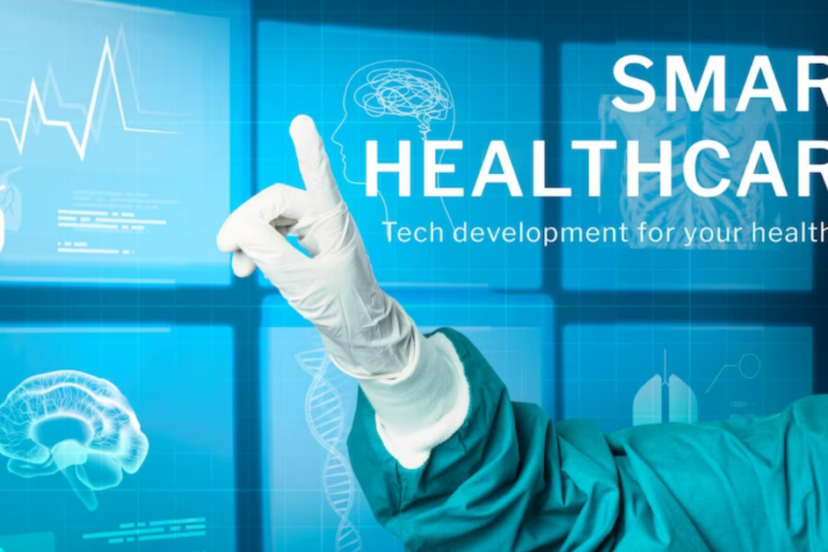AI in Healthcare: The Transformative Power and Potential
Consider a world where algorithms let doctors interpret medical imaging with unparalleled precision. This blog will explore the intriguing and expanding topic of AI in healthcare.
Today, we’ll explore how AI transforms healthcare, enabling significant advances in medical image processing, disease diagnosis, medication discovery, and customized treatment. Discover how AI transforms healthcare to enhance patient outcomes in ways we never imagined. We will learn about AI’s transformational power in healthcare.
Whether you’re a healthcare practitioner, patient, or inquisitive about the future of medicine, this series will help you understand how AI alters healthcare. Let’s discover how AI is improving healthcare together.
How AI is Transforming Healthcare
Artificial intelligence (AI) aims to mimic human cognition. Machines are processing it to mimic human cognitive abilities like learning, reasoning, problem-solving, and decision-making. AI has transformed healthcare by analyzing large volumes of medical data to extract significant insights, assisting in diagnosis, treatment planning, drug discovery, and individualized patient care.
The introduction of AI is the main factor driving a paradigm shift in healthcare as we currently know it. This transformative technology, characterized by its ability to mimic human intelligence, is making waves in several areas of healthcare, ushering in a new era of innovation and improved patient care. So, let’s take a look at how AI is reshaping healthcare.
Medical Image Analysis
AI’s ability to handle and interpret large amounts of data makes it an ideal tool for medical imaging. Machine learning algorithms can analyze radiographic images like X-rays, MRIs, and CT scans, identifying minute abnormalities the human eye might miss. These insights can lead to the early detection and treatment of conditions like tumors, lung diseases, or brain anomalies, thereby improving patient outcomes.
Disease Diagnosis
AI is revolutionizing disease diagnosis with algorithms capable of analyzing complex medical data and delivering accurate results. It can help doctors identify patterns in patient symptoms, medical history, and other relevant clinical data, leading to more accurate diagnoses. In some cases, AI tools can predict diseases before symptoms appear, enabling early intervention and improving recovery chances.
Drug Discovery
Traditional drug discovery is a long and expensive process. However, AI is set to change this with its ability to sift through extensive genetic, biochemical, and pharmacological information databases to predict how potential drugs will interact with various diseases. This can speed up the process of drug discovery, reduce costs, and lead to the development of more effective medicines.
Personalized Medicine
Personalized medicine is one of the most exciting applications of AI in healthcare. By analyzing an individual’s genetic makeup, lifestyle factors, and health data, AI can help formulate tailored healthcare strategies. This can include preventive interventions for high-risk patients or tailored treatment strategies with fewer adverse effects.
Enhancing Patient Care
AI also has a significant role in enhancing patient care. It can streamline administrative tasks like scheduling appointments, reminding patients of medication times, or monitoring patient vitals remotely. This frees healthcare professionals to focus more on patient interaction, improving patient experiences.
The Potential of AI in Healthcare
Artificial Intelligence, a technology replicating human intelligence in a machine, is causing a seismic shift in various industries, and healthcare is no exception. By leveraging AI, we are envisioning a future of healthcare that is more personalized, predictive, and precise. So, let’s delve into the potential of AI in the healthcare sector.
Precision and Personalization in Treatment
One of the most promising aspects is the ability to provide personalized care. AI can analyze a patient’s unique genomic structure, lifestyle, environment, and biometric data to suggest highly individualized treatment plans. This level of customization could increase the effectiveness of treatments and reduce side effects, paving the way for precision medicine.
Accelerated Drug Discovery
The traditional drug development process is costly and time-consuming. AI has the potential to accelerate this process by predicting how potential drugs will interact with the targeted disease. Using traditional methods, AI algorithms can simulate and analyze countless molecules in a fraction of the time it takes. This acceleration could reduce costs and time-to-market, saving millions of dollars and countless lives.
Improved Diagnostics
AI’s potential to improve diagnostics is phenomenal. By analyzing medical images and patient records with unparalleled precision and speed, AI can assist in detecting diseases, such as cancer, at an early stage. Additionally, AI algorithms can continuously learn and improve, potentially leading to even more accurate diagnostic capabilities.
Proactive Health Management
AI can analyze large amounts of health and lifestyle data to predict potential health issues before they become severe, shifting healthcare from reactive to proactive. This potential to anticipate health problems and intervene earlier could significantly reduce healthcare costs and improve patient outcomes.
Enhanced Accessibility
Through telemedicine, AI can also bridge the gap between doctors and patients in remote areas. AI-powered chatbots and virtual health assistants can provide medical advice, schedule appointments, and monitor patients’ vitals, making healthcare more accessible.
Automating Administrative Tasks
AI also holds the potential to ease the administrative burden in healthcare systems. It can automate patient records’ scheduling, billing, and maintenance, saving time and reducing errors.
Conclusion
AI’s impact on healthcare is not simply revolutionary but game-changing. Complex algorithms, tireless machine learning models, and accurate data analytics tools transform health and wellness, making the future a reality. AI is improving medical image analysis, medication discovery, and more by analyzing massive volumes of data. It’s like having a team of doctors working 24/7 to discover irregularities, foresee problems, and determine the best treatment for each patient.
AI’s involvement in customized medicine is ushering in a new era of healthcare where therapies are tailored to each patient’s genetics, lifestyle, and health history. This patient-centric strategy could transform healthcare results and make preventive care the norm.
AI in healthcare is only starting, with endless possibilities. As this intriguing story unfolds, one thing is sure: AI in healthcare is here to stay and will continue to transform wellness in ways we can only fathom.
FAQs
- How does AI improve medical image analysis? AI systems improve medical image analysis by identifying patterns in X-rays, CT scans, and MRIs that humans cannot see. This can discover diseases early and improve treatment.
- Can AI systems diagnose diseases? AI can diagnose diseases. They can analyze a patient’s symptoms, medical history, and clinical data faster than doctors.
- How does AI speed up drug discovery? AI can predict drug interactions with diseases by analyzing massive genetic, biochemical, and pharmacological data. This can drastically reduce drug discovery expenses and speed this up.
- What is personalized medicine in AI? Customized medicine tailors treatments to individuals. AI can forecast illness risk and adapt treatment approaches based on genetics, lifestyle, and health data.
- How does AI enhance health outcomes? AI can find patterns and insights in big data to improve treatment tactics. This and enhanced diagnostic accuracy and prognostic capacities can improve patient care and public health.





Comments are closed.